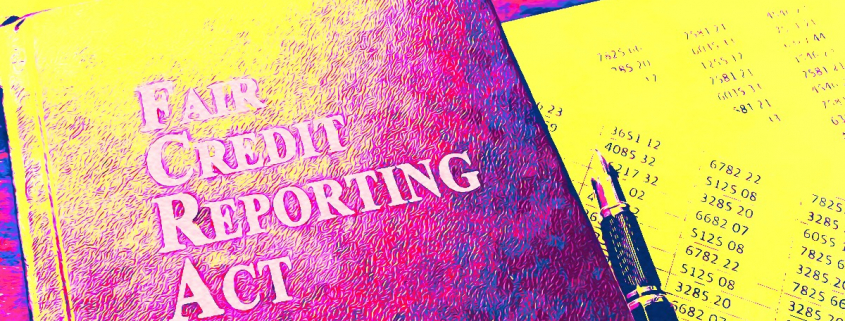What Is the Fair Credit Reporting Act?
During the coronavirus pandemic, Transunion and Equifax will provide all U.S. residents with access to their credit report for no charge every week at annualcreditreport.com/coronavirus.
In this article:
The Fair Debt Collection Practices Act (FDCPA), which was passed by Congress in 1977, protects consumers from unfair debt collection practices. It sets standards for collectors, enforces rules against abusive debt collection practices, and provides damages to victims who suffer harm due to illegal actions taken by debt collectors.
What is the purpose of the FCRA?
The Fair Credit Reporting Act was passed in 1970 to help protect the privacy rights of American citizens by requiring that certain types of personal financial records be kept confidential.
Your financial future depends on having good information about your personal finances available to lenders.
Your credit score has far-reaching effects beyond your ability to obtain a loan or the APR on your credit card. For example, potential landlords may use your credit report to determine if you're trustworthy enough to be allowed into their rental properties.
Depending on where you live, employers may check your background check to see if you're eligible for employment. Insurance providers may use your background check to decide whether they want to insure you.
Glossary about the Faire Credit Reporting Act
Credit, employer, credit score, consumer reporting agencies, credit reporting agencies.
Adverse action, purposes, notice, businesses, application for credit, identity, action, credit reports, credit file, credit history, credit card, disclosure.
Alert, security, Potential employers, applicant, Insurance companies, credit bureau, nationwide credit bureaus, credit rating agencies, period, records, medical records, rental history records, employment purposes.
Victim of identity theft, proper identification, Social Security, job applicants, user, checks, collection, public assistance, days of receipt.
Financial history, extension of credit, credit card companies, credit unions, credit rating, weekly credit report, credit decisions, credit freezes.
Credit worthiness, period of time, time period, public records, criminal record, subsection, identity theft, identity theft victims, extended fraud alert.
Fraud alert, unfair business practices, lists, prospective employer, user of consumer reports, respect, background checks, collection agencies, debt collection agency, punitive damages, damage, nationwide basis, national origin.
Dodd-Frank Act, financial institutions, personal characteristics, police report, elaborate mechanism, files of consumer reporting, personal interviews, signs of fraud, users of consumer reports, consumer protection agency, annual reports.
Investigative report, government agencies, duty military, credit capacity, eligibility for credit, credit standing.
Equifax Core Credit, ab"Free Credit Reports", abcConsumer Credit Protection Act, accurate credit reports, additional credit, annual credit reports.
Brim V. Midland Credit Mgmt., consumer credit report files, credit accounts, Credit agencies, credit card issuers, credit credit- based insurance scores, credit determinations, credit evaluation, credit report disputes, credit scoring systems.
Fair Credit Reporting ActUnited States Government Publishing Office, sort of credit agreement, standardization of credit scoring.
V. Midland Credit Mgmt. Inc., 1-bureau credit score access, 1501 Farm Credit Drive McLean, six-month period.
1-year period, 12-month period, 2-month period, 2-year period, 24-month period, conviction records, detailed record, juvenile records.
Violation of subsection, agency under subsection, requirements of subsection, reinvestigation under subsection, report under subsection, household purposes, permissible purposes, report for employment purposes, notice in advance, separate notice, verbal notice.
45-day notice, proof of identity theft, file disclosure, annual disclosures, consumer disclosure, source for disclosure, active duty military alerts, 1-year alert, business days, normal business hours.
United States Small Business Administration, list of companies classified, list of consumers, marketing lists, partial list.
Personal identification, identification, proof of identification, security freezes, adverse employment action, screen job applicants.
Prospective user, determination with respect, purposes with respect, check in response, actual damages, basis, contingency fee basis.
Customer Assistance Group, a. Office of the Comptroller of the CurrencyCustomer Assistance
What does the FCRA help consumers do?
The FCRA protects consumers by regulating how companies use their personal financial records. Here's an overview.
- You have the right to be informed if information in your credit report has been denied because of something in your credit history.
- If you want to know whether there is any derogatory information about you in their files, go to AnnualCreditReport.com. To request an annual copy of your report for free, visit AnnualCreditReport.com/myreport.
- You can get a copy of your own consumer report for free once every 12 months from each of three major U.S. consumer reporting agencies by visiting annualreport.com. However, if someone else wants to look at your report, they need your permission. Most states require that employers obtain your permission before accessing your report. Some states even prohibit employers from obtaining your report unless there is a legitimate business reason.
- If you find what appears to be an error on your report, you may dispute it. You can do so by contacting one of the three major consumer reporting agencies directly. They'll ask you to provide documentation supporting your claim. If they determine that the disputed item is accurate, they'll take action to fix it. If they decide that the item is incorrect, they'll delete it.
- You can opt out of receiving pre-screend offers from credit card companies.
- A security freeze prevents anyone from accessing your personal financial information without your express permission.
You may be able to see a more detailed summary of federal Fair Credit Reporting Act (FCRA) regulations here or go to www.consumerfinance.gov/fcra for more details.
For Spanish-language information, visit consumerfinance.gov/espanol or write to the Consumer Financial Protection Bureau at 1700 G Street NW, Washington, DC 20036.
A Summary of Your Rights under the Fair Credit Reporting Act
The Federal Fair Debt Collection Practices Act (FDCPA), also known as the Fair Debt Collections Act, was enacted into law in 1977 to protect consumers against debt collection abuses. In addition to protecting consumers from being harassed, abused, or misled by third parties attempting to collect debts owed to them, the FDCPA protects consumers from abusive practices by debt collectors. The FDCPA applies to any person who attempts to collect an alleged debt through legal action.
If someone uses your personal information (like a credit history) to deny your request for credit, insurance, employment, or any other benefit, they must tell you, and they must provide your name, contact information, and the name, mailing and/or physical addresses, and telephone numbers of the agencies that supplied them with the information.
You have the right of access to your own personal data. You can ask us for an explanation of how we process your personal data and whether we share it with third parties. You also have the right to correct any inaccuracies in your personal data.
- A person has taken adverse actions against you because of something in your financial records.
- You're the victim of ID fraud and put a fraud alert in your account.
- your files contain incorrect information due to fraud;
- You're receiving government benefits.
- You're currently unemployed but plan to look for a job within 60 days.
You're entitled to one free copy of your credit report every year at no charge from each national credit bureaus and from each national specialty consumer reporting agency. For more information, visit www.consumerfinance.gov/learnmore.
You can ask lenders for your own personal copy of your FICO® Score (Fair Isaac Corporation) if you choose. Your FICO® Score is an objective measure of your financial health. It’s calculated based on the amount of debt you owe, how much money you make, where you live, and how old you are. Lenders use your FICO® Score to determine whether they should approve your loan application. They also consider your FICO® Score when setting interest rates.
You may request that the credit bureau remove any item from your credit report if there is incomplete or inaccurate info. You can contact the credit bureau directly at 1-877-567-8688.
Consumers who file complaints against credit bureaus must provide proof that they were harmed by an error or omission in their credit reports. If consumers fail to prove harm, the credit bureau is not required to remove the disputed item from their credit reports.
Most credit bureaus don't report bad debt older than 7 or 10 year old bankrupts.
You can view your credit report at any time. However, a consumer reports agency may give out your credit report only if they believe there is a valid reason for doing so. For example, if someone wants to check your credit history to see whether you're eligible for a loan.
In order to provide you with an optimal experience, we use cookies. By continuing to browse our site, you agree to our use of cookies. To learn more, click here.
If you want to limit unsolicited prescreener offers of financial products and services, you can contact one of the three major national consumer reporting agencies directly by calling 1 888 5OPTVOTE (1 888 5 67 8688).
You may seek legal action against violators if a credit bureau, or, in some instances, an issuer of credit reports or a furnisher of information to a credit bureau violates the FCRA.
Identity theft victim and active duty military personnel may be entitled to additional protections under federal law. To learn more, please go to http://www.consumerfinance.gove/.
Consumers Have The Right To Obtain A Security Freeze
You have a legal right to put a "frozen" on your own financial records. But, if you use that frozen status to stop someone else from accessing your personal and financial records, you could end up delaying their ability to get a new job, buy a house, or open a bank account.
You can also get a free copy of your report online by visiting www.annualfico.com/free_report. Once you've received your free report, you'll receive instructions on how to download your report.
A credit freeze doesn't apply to a person or company, or their affiliates, or collection agents who request information from your credit report for the purpose of reviewing or collecting the debt. For example, if you owe someone $1,000, they may want to review your credit reports to see whether there are any accounts that haven't been paid off yet. If so, they could then contact you directly to ask for payment.
You can find out what your credit score is and how much debt you owe by visiting one of the following sites:
Aviation Consumer Protection Division
Department of Transportation
1200 New Jersey Avenue SE
Washington, DC 20590
395 E Street, SW
Washington, DC 20423
U.S. Small Business Administration
409 3rd St., SW, 8th floor
Washington, DC 20416
100 F St NE
Washington, DC 20549
1501 Farm Credit Drive
McLean, VA 22102-5090
600 Pennsylvania Avenue, N.W.
Washington, DC 20580
(877) 382-4357
1700 G Street NW
Washington, DC 20552
Customer Assistance Group
1301 McKinney St., Suite 3450
Houston, TX 77010-9050
PO Box 1200
Minneapolis, MN 55480
Notification of Rights
- Notifications of rights for California consumers
- Notifications of Rights for Colorado Consumers: What are they?
- Notifications of rights for consumers in Connecticut
- Notice of Rights for Maryland Consumers
- Right to Know Notice for Massachusetts Consumers
- Notifications of Rights for Texas Consumers: What do they mean?
- Notification of Rights for Vermont Consumers
- Notice of Rights for Washington Consumers.



